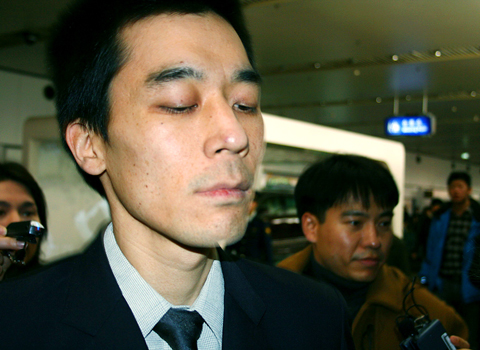Looking pale and drawn, a US missionary headed home yesterday after North Korea released him from six weeks’ detention for crossing its border on Christmas Day to protest religious suppression in the totalitarian regime.
Robert Park, his eyes almost closed, made no comment as US consular officials guided him to a transit area in Beijing’s airport after his arrival from North Korea.
He was to leave later in the day, US embassy spokeswoman Susan Stevenson said.

PHOTO: REUTERS
“We welcome North Korea’s release of Robert Park,” she said.
Park, 28, crossed the frozen Tumen River from China into North Korea carrying letters calling on leader Kim Jong-il to close the country’s notoriously brutal prison camps and step down from power — acts that could have risked execution in the hard-line communist country.
North Korea disclosed nothing about Park during his 43 days in custody before announcing on Friday that he would be freed and crediting elaborate remarks to Park about how he now viewed North Korea favorably on religious freedom and human rights.
The North Korean government “decided to leniently forgive and release him, taking his admission and sincere repentance of his wrongdoings into consideration,” the Korean Central News Agency said.
The report quoted Park, of Tucson, Arizona, as saying he was ashamed of the “biased” view he once held of the nation.
Park said he was now convinced “there’s complete religious freedom for all people everywhere” in North Korea, citing the return of his Bible and a service he attended at Pongsu Church in Pyongyang, KCNA said.
“I would not have committed such crime if I had known that the [North] respects the rights of all the people and guarantees their freedom and they enjoy a happy and stable life,” it quoted him as saying.
Park did not respond to questions from reporters yesterday asking whether he had been speaking freely or under duress.
North Korea’s Constitution guarantees freedom of religion but the government severely restricts religious observance, only allowing worship — primarily by foreigners — at sanctioned churches.
KCNA said Park told the news agency he had felt compelled to go to North Korea to draw attention to reported rights abuses and mass killings.
“We are just elated that he’s been released safely,” Madison Shockley, a Park family pastor in Carlsbad, California, said by phone. “We cannot wait for him to land on American soil and to hear the truth of what he discovered there.”
Shockley said Park’s Korean-American parents were told of the release by the State Department on Friday and were very happy but almost in shock.
“The mother will only truly believe it when he is in her arms,” Shockley said.

MORE VISITORS: The Tourism Administration said that it is seeing positive prospects in its efforts to expand the tourism market in North America and Europe Taiwan has been ranked as the cheapest place in the world to travel to this year, based on a list recommended by NerdWallet. The San Francisco-based personal finance company said that Taiwan topped the list of 16 nations it chose for budget travelers because US tourists do not need visas and travelers can easily have a good meal for less than US$10. A bus ride in Taipei costs just under US$0.50, while subway rides start at US$0.60, the firm said, adding that public transportation in Taiwan is easy to navigate. The firm also called Taiwan a “food lover’s paradise,” citing inexpensive breakfast stalls

TRADE: A mandatory declaration of origin for manufactured goods bound for the US is to take effect on May 7 to block China from exploiting Taiwan’s trade channels All products manufactured in Taiwan and exported to the US must include a signed declaration of origin starting on May 7, the Bureau of Foreign Trade announced yesterday. US President Donald Trump on April 2 imposed a 32 percent tariff on imports from Taiwan, but one week later announced a 90-day pause on its implementation. However, a universal 10 percent tariff was immediately applied to most imports from around the world. On April 12, the Trump administration further exempted computers, smartphones and semiconductors from the new tariffs. In response, President William Lai’s (賴清德) administration has introduced a series of countermeasures to support affected

CROSS-STRAIT: The vast majority of Taiwanese support maintaining the ‘status quo,’ while concern is rising about Beijing’s influence operations More than eight out of 10 Taiwanese reject Beijing’s “one country, two systems” framework for cross-strait relations, according to a survey released by the Mainland Affairs Council (MAC) on Thursday. The MAC’s latest quarterly survey found that 84.4 percent of respondents opposed Beijing’s “one country, two systems” formula for handling cross-strait relations — a figure consistent with past polling. Over the past three years, opposition to the framework has remained high, ranging from a low of 83.6 percent in April 2023 to a peak of 89.6 percent in April last year. In the most recent poll, 82.5 percent also rejected China’s

PLUGGING HOLES: The amendments would bring the legislation in line with systems found in other countries such as Japan and the US, Legislator Chen Kuan-ting said Democratic Progressive Party (DPP) Legislator Chen Kuan-ting (陳冠廷) has proposed amending national security legislation amid a spate of espionage cases. Potential gaps in security vetting procedures for personnel with access to sensitive information prompted him to propose the amendments, which would introduce changes to Article 14 of the Classified National Security Information Protection Act (國家機密保護法), Chen said yesterday. The proposal, which aims to enhance interagency vetting procedures and reduce the risk of classified information leaks, would establish a comprehensive security clearance system in Taiwan, he said. The amendment would require character and loyalty checks for civil servants and intelligence personnel prior to